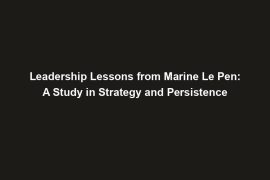Hey there, history buffs and aspiring leaders! Today, we’re diving into the fascinating world of Cardinal Richelieu, a key figure in history whose leadership style continues to inspire and teach us valuable lessons to this day.
So, who exactly was Cardinal Richelieu? Well, he was a powerful and influential figure in 17th century France, serving as Chief Minister to King Louis XIII. Known for his strategic thinking and political prowess, Richelieu was a master at navigating the complex web of politics and power struggles of his time. His ability to maintain control and influence in a tumultuous political environment is truly impressive and worth studying.
In this blog post, we’ll be taking a closer look at Richelieu’s leadership style, delving into how he approached leadership with decisiveness and determination. We’ll analyze how he leveraged his strategic thinking to achieve his goals and maintain his position of power. Trust me, there’s a lot we can learn from this historical figure!
But why should modern leaders care about studying Cardinal Richelieu? Well, his principles of leadership are timeless and can be applied to various leadership roles today. From the importance of adaptation and flexibility in navigating changing circumstances to the significance of building strong relationships and alliances, Richelieu’s lessons are truly invaluable for leaders in any field.
I’m excited to share these insights with you and explore how we can incorporate Richelieu’s leadership principles into our own roles. So buckle up, folks, and get ready to uncover the secrets of a legendary leader!
Cardinal Richelieu’s Leadership Style
When it comes to leadership, Cardinal Richelieu was truly a force to be reckoned with. His approach to leadership was marked by strategic thinking, political acumen, and a steadfast determination to achieve his goals. Let’s dive deeper into Richelieu’s leadership style to uncover the lessons that modern leaders can learn from.
Strategic Thinking and Political Acumen
Richelieu was a master strategist who understood the intricacies of power dynamics and how to leverage them to his advantage. He was known for his ability to anticipate his enemies’ moves and counter them effectively. This ability to think several steps ahead helped Richelieu maintain power and control in a tumultuous political environment.
Imagine playing a game of chess where every move you make has repercussions for the entire board. That’s the level of strategic thinking that Richelieu brought to his leadership. He was able to navigate political minefields with finesse, always staying one step ahead of his opponents.
Decisiveness and Determination
One of the key characteristics of Richelieu’s leadership style was his decisiveness and determination. When he set his sights on a goal, he pursued it relentlessly, never wavering in the face of obstacles or opposition. This unwavering determination was instrumental in his ability to achieve his objectives and cement his power.
Think of Richelieu as a bulldog – once he sunk his teeth into a goal, there was no letting go. This unwavering determination is a valuable lesson for modern leaders, reminding us of the importance of staying committed to our goals even in the face of adversity.
As we delve deeper into Cardinal Richelieu’s leadership style, it becomes clear that there is much to be learned from his approach. His strategic thinking, political acumen, decisiveness, and determination are qualities that can benefit any leader looking to make a lasting impact. Stay tuned as we explore how these lessons can be applied to modern leadership roles in the next section of the blog post.
Lessons for Modern Leaders
Now that we’ve delved into Cardinal Richelieu’s leadership style from centuries past, let’s take a closer look at how his principles can be applied by modern leaders in today’s world. While the political landscape has certainly evolved over the years, there are timeless lessons that Richelieu’s approach can teach us about effective leadership.
Adapting and Remaining Flexible
One of the key lessons we can learn from Cardinal Richelieu is the importance of adaptation and flexibility in leadership. Richelieu faced numerous challenges during his time, including navigating through shifting alliances and political landscapes. By remaining adaptable and flexible in his strategies, Richelieu was able to effectively respond to changing circumstances and maintain his position of power.
Modern leaders can take this lesson to heart by recognizing the need to be agile and open to new ideas. In today’s fast-paced and ever-changing business environment, the ability to adapt to new situations and pivot when necessary is crucial for success. By embracing flexibility and being willing to adjust their strategies as needed, leaders can better position themselves to lead their teams through challenges and capitalize on opportunities.
Building Strong Relationships and Alliances
Another important aspect of Cardinal Richelieu’s leadership style was his skill in building strong relationships and alliances. Richelieu understood the power of diplomacy and the value of forming strategic partnerships to further his goals. By forging alliances with key players in the political arena, Richelieu was able to consolidate his power and navigate complex political landscapes with ease.
Modern leaders can apply this lesson by focusing on building strong relationships with their teams, stakeholders, and industry peers. By cultivating trust, respect, and collaboration, leaders can create a solid foundation for success and establish themselves as effective leaders in their field. Just as Richelieu relied on his diplomatic efforts to achieve his objectives, today’s leaders can leverage their relationships and alliances to drive innovation, foster teamwork, and achieve their strategic goals.
By studying historical leaders like Cardinal Richelieu, modern leaders can gain valuable insights into effective leadership practices that have stood the test of time. By applying these lessons in their own roles, leaders can enhance their leadership skills, inspire their teams, and achieve greater success in their endeavors. So, how will you incorporate Richelieu’s timeless lessons into your own leadership approach?



